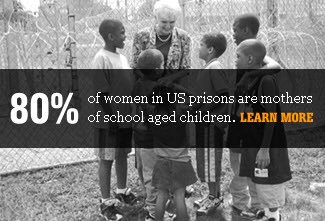When Parents Are In Prison, So Are Their Children
Women and children. Two segments of the population we cherish and try to protect. But, sadly, not if the woman is in the prison system.
Now, don’t for a minute think that I’m soft on women who commit crimes because I’m not. But generational incarceration is a real thing and we are doing little as a society to stop it.
Since 1980, the U.S. has seen a rise of more than 500% in the number of inmates in our jails and prisons. But females make up the fastest growing segment of prisoners, up more than 700%. Of the 1.2 million women currently under criminal supervision – in local jails, state or federal prison or under parole or probation – a full two-thirds are mothers. Many are single mothers.
Think of all the children left behind.
 Research shows that children of incarcerated parents have significantly higher rates of being expelled from school, turning to drugs or alcohol and of going to prison themselves. It is a terrible cycle. And one major thing that might make the difference to the child – continued contact with a loving parent – is the very thing our justice system often denies them.
Research shows that children of incarcerated parents have significantly higher rates of being expelled from school, turning to drugs or alcohol and of going to prison themselves. It is a terrible cycle. And one major thing that might make the difference to the child – continued contact with a loving parent – is the very thing our justice system often denies them.
The Marshall Project along with Teen Vogue Magazine recently hosted a video chat with formerly incarcerated women and the adult daughter of a convict. Their candid conversation about life inside a women’s prison might shock you.
Kyndia Riley was just 2 when both her parents went to prison. Mom was sent to Connecticut, her Dad to a prison in Pennsylvani, Kya. Little Kyndia was raised by relatives in Virginia. It took 10 hours to drive to see her mother and there was no money for an overnight hotel stay. As she grew older she realized the indignity her mother had to go through just to enter the prison visiting room.
“You have to take off all of your clothes, do the squat,” Kyndia told the interviewer. “When I would go visit her and it would happen to her it was like she had to take a moment to herself because she just had a guard fondling her – naked. She has to get herself together because her dignity has been stripped.” Kyndia, now in college, also admitted that she deliberately acted out in school thinking if she was bad enough she too would be sent to prison and then she’d get to be with her Mom. Only after the dean of students asked her, “Hey, what is going on with you?” did she realize the futility.
If only there were enough concerned adults to sit down and really communicate with the children of incarcerated parents.
Ex-con Ayana Thomas was asked what it was like to try to parent her child from behind bars. During visits an inmate gets a quick “initial hug,” Ayana said.
“But they can’t sit on your lap, you can’t hold their hand.” The visits with her daughter were so emotional during the last nine months of her sentence Anaya told her family not to visit anymore.
“I could do my time easier without the stress of (it,)” she told the reporter. “It took me two days to recuperate from a visit, from my daughter crying. You know, just the whole ripping you apart all over again.”
Former inmate Sara Zarber said she could relate. “My mom visited me when I was incarcerated and she would talk about going through the metal detectors and, like, having to take off her bra sometimes. Having to go through that and the shame of it she felt. So, I told her at one point, ‘Don’t come.’”
If only prisons made it easier for families to remain close.
Prison jobs earn the inmates less than a dollar an hour, about $13 a month in Ayana’s case. With that they must buy phone time home, personal products like shampoo, toothpaste or monthly hygiene products – which often sell at the prison commissary for inflated prices. (Just two months ago a memo went out from the Federal Bureau of Prisons requiring a range of feminine hygiene products to be distributed free. State prisons and jails were not included in the directive.)
Some inmates are lucky enough to have family adding money to their commissary account but in many cases relatives must choose between sending money to their loved one or using it to pay for the children to visit.
There’s a bill pending in Congress now called The Dignity for Incarcerated Women Act. It requires the Federal Bureau of Prisons to consider the geographic divide between women and their children before assigning a prison. It reforms visitation policies, outlaws charging inmates for essential hygiene products and prohibits handcuffing and solitary confinement for pregnant women.
Here’s hoping state prisons also realize that anything we do to strengthen family bonds could help all of society down the road.

Linked In Connection Carrie Lee McClelland writes:
This is crucial information and a huge issue in both short term county incarceration and long term …THANK YOU!
Facebook Friend Ginnie Oleskewicz Schwartz writes:
I agree with making it easier for Mom’s and children to visit. I was a foster parent in CT for many years and had to bring children to visits. It was very difficult on the kids also . Mommy couldn’t hold them, rock them ECT. The kids would act out for days because of mixed feelings.
Facebook Friend Marilyn Kaskel writes:
Produced my 1st mothers in prison show, w Geraldo, 30 years ago. Hard to believe lessons haven’t been learned yet.
Facebook Friend Sue Corcoran writes:
The system seems to love mass incarceration. Prisons for profits is what it’s all about. For approx 4 decades women have been the fastest growing prison population. The US has one third of the worlds female prison population, approx 200,000 women are in jails or prisons, a rise of approx 646% since 1980, and the majority are mothers. Does the Government care about mothers and children not bonding, I think not. They are probably rubbing their hands together, and counting the money in advance, that they are going to be making from the next unfortunate generation that ends up with an inmate number.
Facebook Friend Richie Hydell writes:
My guess is some of them killed good people taking their children away forever. once convicted you give up all rights to freedom as far as their children case by case basis.
Ginnie Oleskewicz Schwartz replies:
I truly believe that a very high percentage of the women are in there for drugs or crimes due to drugs..
Richie Hydell replies:
we can also believe in Santa clause but did you research each of their sentences?
Diane Dimond replies to Richie Hydell
Actually Ginnie Oleskewicz Schwartz is correct. According to the Bureau of Prisons the majority of women in prison are in on drug related charges – not murder.
Facebook Friend Anthony Flacco writes:
I believe your sympathy is misplaced. Consider the children abandoned by criminal parents who do not consider their parental role enough to avoid crime. They do not have the empathy you have, and it is their children who pay the price. A simple “fix” of imitation mercy is an imitation fix.
Diane Dimond replies:
Your view pre-supposes that no one who goes to prison can be rehabilitated or pass on valuable lessons to their children about what NOT to do with their life.
I completely agree that adults with children who willingly commit crimes are unthinking and selfish parents, not prescient enough to realize their actions could leave their children parent-less. But until you see female inmates interacting with their visiting children in a prison visitation room (as I frequently do at Bedford Hills Women’s Prison and other prisons) I’m not sure you can fully grasp how meaningful these visits are.
Yes, Mom was a complete jerk to commit the crime she did and put her child(ren) in jeopardy but she is their mom. The minute the see each other across the room there is a connection like none other in life. I’ve heard mothers scolding their children to behave so “you don’t wind up in a place like this … Don’t do what I did.” Very powerful stuff, Anthony.
Are all incarcerated mothers deserving to have an on-going relationship with their children? No. But many are. The system should nurture that not make it tougher.
Facebook Friend Elizabeth Blackburn writes:
When a law is bad it needs to be changed. Thank you for your great heart ❤and working to change the system.
Facebook Friend Debra Garnett writes:
I witnessed this in Danbury’s FCI.. Very sad…
Facebook Friend Eddie Emmons writes:
Americans really believe people in Jail or Prison should suffer…until it’s them or someone they love…….
Facebook Friend Daniel Simone writes:
The state correction system is purposely designed to make inmates’ and their family’s lives difficult. And though to a certain extent I agree with Anthony Flacco, however, many people are imprisoned for crimes they committed out of extreme need, or in ignorance of the legal subsequences. Then, of course,14 percent of inmates, statistically, are innocent.
Facebook Friend Daniel B. Morgan writes:
Duh ! Maybe stop doing crimes……………………
Facebook Friend J.a. Yates Crime Author writes:
I agree with both points of view. I saw inmates use kids to smuggle in contraband then cry because they miss their kids. Or they suddenly start loving/missing the kids when they get locked up. I also know kids visiting parents makes for a good day. And guys, we just cannot do the “lock em up and toss the key” thing. 98% of the inmate population will be released. 4 out of 5 females incarcerated have on average 2 kids. So, what’s the answer?
Facebook Friend Daniel Simone replies:
Yates, there are several solutions available. The first is to ensure that prosecutions by District Attorneys uphold judicial integrity. Many defendants are wrongfully prosecuted by corrupt, self-serving prosecutor. Just this week Suffolk County DA Tom Spota, was indicted for such egregious deeds. I predicted Spota’s corruption 11 years ago when I reviewed the murder case of a 17-year-old, Martin Tankleff, who spent 17 years imprisoned for killing his parents. There was a preponderance of evidence exculpating Tankleff, but Spota refused to acknowledge it. The reason was that spota was protecting the actual killer, Jerry Steuerman. Eventually, Attorney General Cuomo vacated the murder indictments against Tankleff. The second solution would be to erect a watchdog agency to supervise and control the state prison system.